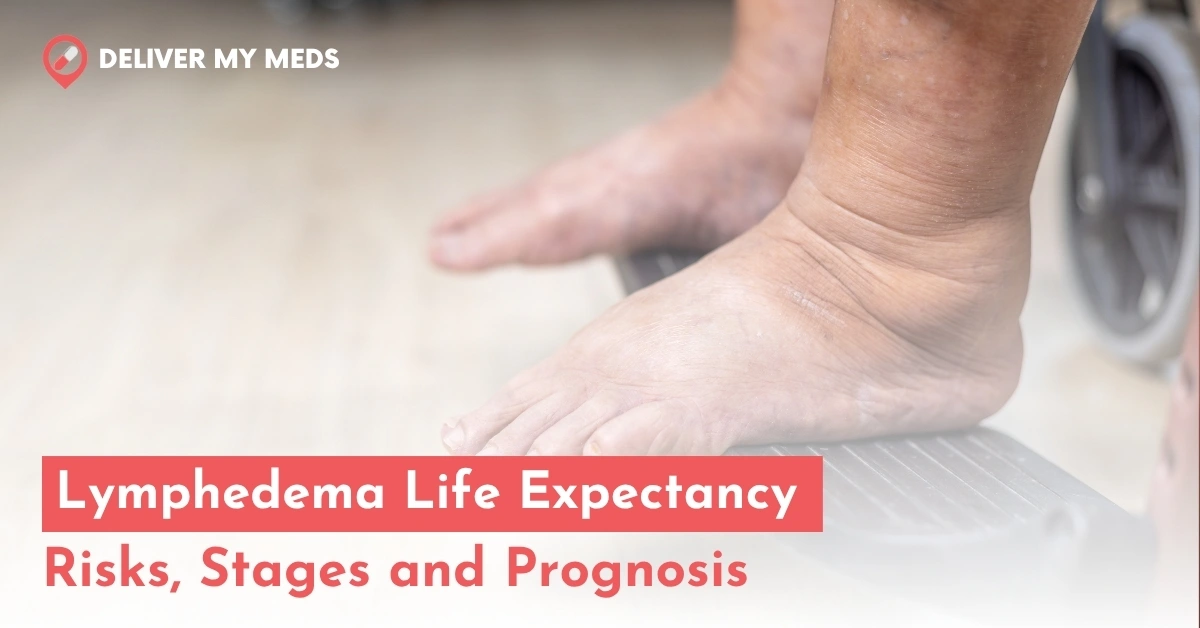
Lymphedema isn’t just a swelling; it’s a chronic problem whose occurrence is caused by the accumulation of fluid in the lymphatic system. Most people are told that it is not dangerous, and that’s true in the early stages, but only partially. However, left unattended, after some time, lymphedema may cause severe issues: persistent infections, pain during movement, and even cancer of the lymphatic system with little chances of survival. If you’re living with it or assisting a relative or friend who is suffering from this condition, one of the questions you might think of is the impact of the condition on life expectancy.
In this guide, we break down what lymphedema life expectancy really means. You will learn how the illness progresses, what signs to track at each phase, and how the outcomes might be influenced by conditions such as blood sugar, blood pressure, drinking alcohol, or neck involvement. We’ll also cover how tools like DMM’s compression pumps can make home management easier and help avoid complications down the line.
What Is Lymphedema? Chronic Nature & Long-Term Risks
Lymphedema is a swelling disorder that occurs most commonly in the arms or legs because of excess lymph fluid. It results from damage or obstruction of the lymph system. For a lot of people, it develops following cancer treatment, surgery, or injury.
In some cases, it’s present from birth due to abnormal development of the lymph vessels.
The Two Types of Lymphedemas are given below:
- Primary lymphedema: The disease is hereditary and is usually associated with impairment related to the development of lymphatic vessels.
- Secondary lymphedema: It is more prevalent and typically occurs after some damage due to surgical operation, radiation therapy, infections, or cancer itself.
The Reasoning behind Early Diagnosis
Early diagnosis of lymphedema makes a big difference in the success of treatments. When it is diagnosed early, it can stop the condition in progressing. This is done by complications like infection of the skin, tissues hardening (fibrosis) and development of edema. By treating the condition earlier, one has a greater likelihood of remaining mobile and pain-free, and the condition can even extend life expectancy attributed to lymphedema in the long run.
Note: If you are interested in what the difference is between lymphedema and edema, read our blog because not all types of swelling are the same.
Does Lymphedema Reduce Life Expectancy?
One of the most common questions asked by patients who suffer from lymphedema is whether it has any implications for their lifespan. The condition alone does not lead to shorter life expectancy. But in case it is not treated, serious complications may arise affecting survival.
Realistic Results vs. Misunderstandings
Lymphedema does not lead to heart or organ failures but uncontrolled lymphedema swelling can trigger a domino effect of troubles.
These are:
- Long-term infections of the skin such as cellulitis
- Depressed mobility leading to increased chances of blood clots and pressure ulcers
- Progressive tissue fibrosis, making swelling permanent
- Occasionally a cancer type known as lymphangiosarcoma.
- Sepsis, especially in advanced disease
The situation is even worse in diabetes patients since they are at risk of developing chronic ulcers and recurrent cellulitis because of impaired circulation and their inability to heal wounds.
Lymphedema Stages (0 to 4) and Prognosis at Each Stage
Stage of Lymphedema is between 0-3 (Stage 0 (latent) and Stage 3 (lympho-static elephantiasis)). Lymphedema staging ranges from Stage 0 (latent) to Stage 3 (lympho-static elephantiasis). Before exploring advanced cases, it’s essential to understand all lymphedema stages, as prognosis varies significantly at each level of progression:
Staging Table:
| Stage | Clinical Features | Risk Level | Prognosis |
| Stage 0 | Lymphatic dysfunction, no visible swelling | High (if untreated) | Reversible with early care |
| Stage 1 | Soft pitting edema, reversible overnight | Moderate | Excellent if treated promptly |
| Stage 2 | Non-pitting, fibrotic swelling | High | Requires lifelong management |
| Stage 3 | Severe thickening, deformity | Critical | Risk of sepsis and disability |
| Stage 4 | Ulceration, malignancy, systemic involvement | Very High | Life-threatening in some cases |
Can You Die from Stage 3 Lymphedema?
Yes, in rare cases. Stage 3 lymphedema may cause death via sepsis, immobility complications, or organ strain, especially in patients with poor general health.
Stage 4 Lymphedema Life Expectancy Insights
Highly variable. Without control of infections and associated malignancies, risk of mortality increases. Prognosis depends on comorbid disease burden and treatment response.
Lymphedema in the Neck: Life Expectancy and Complications
Lymphedema in the neck affects life expectancy based on airway patency, underlying cancer status, and degree of lymphatic obstruction
Airway Compression, Cancer, and Other Risks
- Tracheal narrowing or airway obstruction
- Swallowing dysfunction
- Recurrent aspiration and pneumonia
- Disrupted brain and facial lymph drainage
Lymphedema in the neck affects life expectancy, depends on airway patency and underlying cancer prognosis. Continuous monitoring is essential. This location carries more serious risks due to proximity to vital structures. Monitoring is essential.
Can Lymphedema Cause High Blood Pressure?
Yes. Fluid overload, inflammation, and increased vascular resistance may lead to secondary hypertension in some cases.
Heart, Kidney, and Metabolic Implications
- Obesity, which worsens lymphatic congestion
- Heart strain from chronic inflammation
- Renal overload due to poor lymphatic clearance
- Diabetes mellitus, especially uncontrolled Type 2 diabetes
Multimorbidity sharply reduces life expectancy, even if lymphedema is not the primary cause of death.
Does Alcohol Cause Lymphedema?
Chronic alcohol use may impair vascular integrity and lymphatic transport, especially in the abdomen and limbs.
Can Alcoholism Cause Lymphedema or Worsen It?
Yes. Alcohol promotes:
- Systemic inflammation
- Hepatic dysfunction, leading to hypoalbuminemia
- Vascular leakage and interstitial fluid retention
Lymphedema Caused by Alcohol Abuse: Clinical Cases
Studies suggest that lymphedema and alcohol abuse often coexist in cirrhotic patients. In these patients, protein deficiency and venous insufficiency contribute to refractory edema.
Treatment, Control & Life Extension Strategies
Complete Decongestive Therapy (CDT)
Gold standard, includes:
- Manual Lymphatic Drainage (MLD)
- Compression bandaging
- Exercise & skin care
Compression Pumps & Garments
- Pneumatic devices such as the Bio Compression SC series improve lymph flow.
- Used daily to prevent volume rebound and fibrotic change.
Surgical Interventions
- LVA (Lymphaticovenous Anastomosis)
- VLNT (Lymph Node Transfer)
For late-stage or treatment-resistant disease only.
Devices That Improve Long-Term Outcomes
Compression devices enhance treatment adherence and improve functional outcomes.
| Device | Function | Benefit to Prognosis |
| Bio Compression SC-4004-DL | 4-chamber pump sequential pump | Ideal for mild moderate cases |
| Bio Compression SC-4008-DL | 8-chamber gradient pump | Suitable for advanced edema |
| Bio Compression SC-2004-DL | Compact 4-chamber unit | Home use & maintenance therapy |
DMM offers fast delivery and insurance-covered options for these systems.
Living With Lymphedema: How Long Can You Live?
With proper care, patients live normal lifespans.
Key insights:
A 2020 study in Lymphatic Research and Biology showed no survival difference in treated patients vs. healthy controls unless other diseases were present.
Is Lymphedema a Disability?
In advanced stages, yes. It affects daily functions:
- Walking and driving
- Work performance
- Social participation
Some people qualify based on the severity.
Some special attention should be paid to people with diabetes since poor skin integrity, nerve damage, and slow healing cause difficulties with controlling lymphedema and make it more infection-prone.
Conclusion
Lymphedema life expectancy is not determined by the diagnosis alone but how it is treated is what matters most. Failure to treat the disease can lead to life-threatening situations like infection, inability to move, and long-term organ stress, especially at an advanced stage.
Nevertheless, early diagnosis, constant treatment, appropriate tools, and management can help one get their life under their control and protect their future as long as treated properly.
In most of these patients, the treatment option involves compression pumps and the use of garments that help reduce swelling as well as the chances of the disease developing further. At DMM, we support your treatment plan by offering reliable, insurance-covered devices like the Bio Compression SC series, delivered right to your door. No matter if you’re just beginning to learn about lymphedema or struggling with severe stages, remember: true control starts with knowledgeable action, and you’re already taking the right step.




